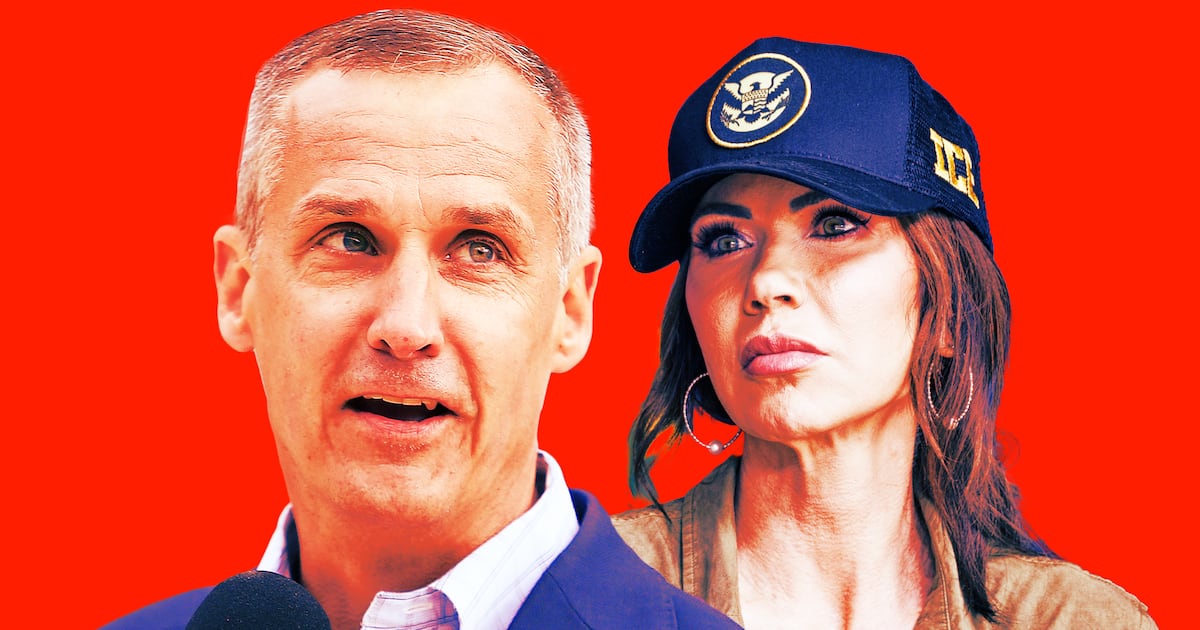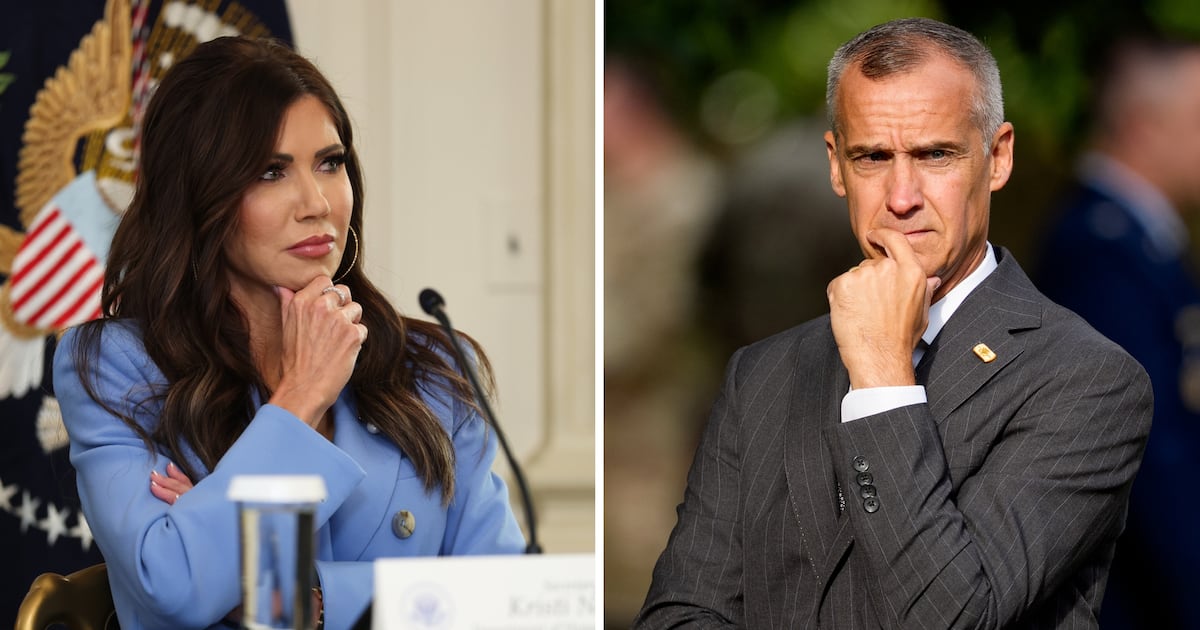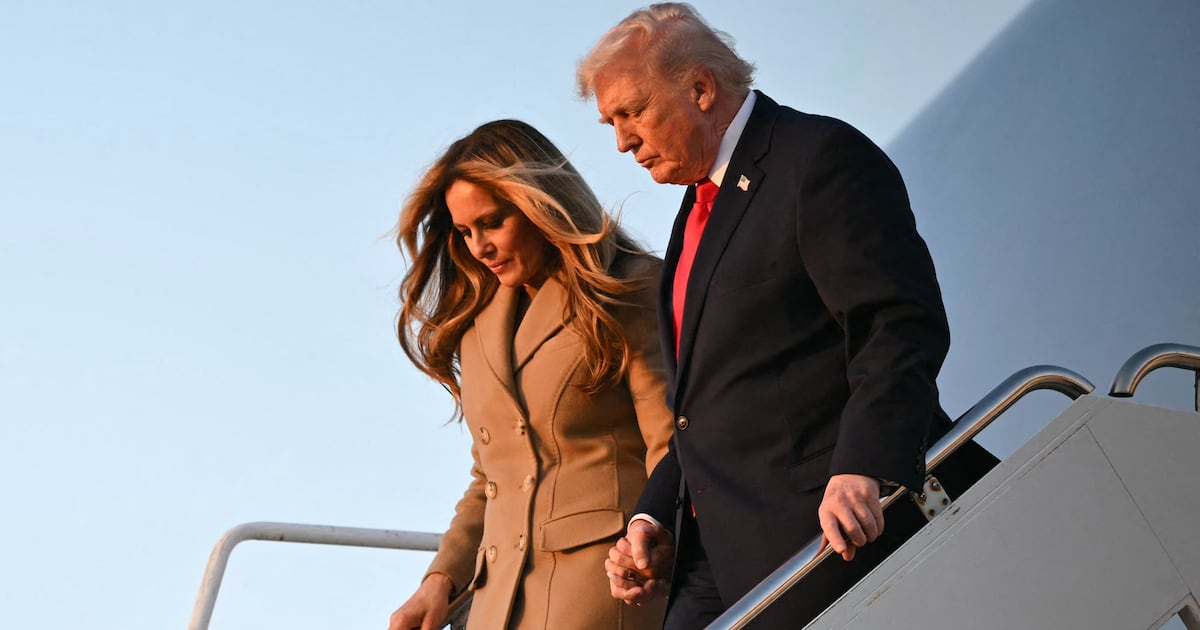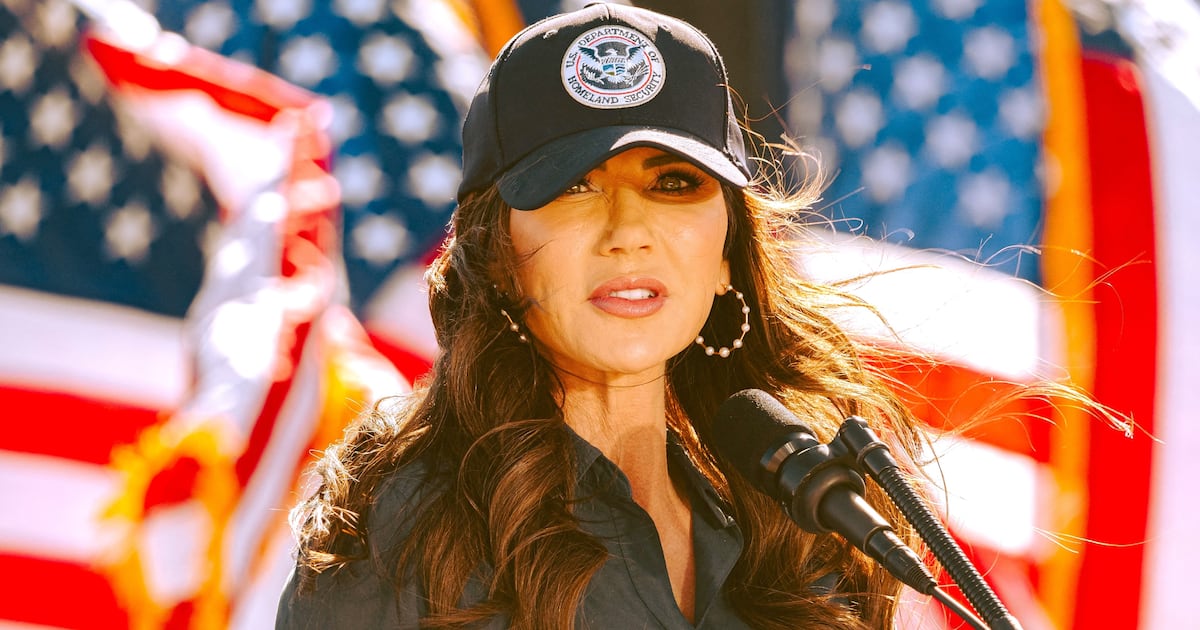There’s no shortage of candidates for president—at least on the GOP side. But only a few of these candidates have a real shot. More of them, it seems, are running for different motives.
Still, we thought it was important to keep a running tally of every serious candidate for office and offer some political analysis as to why they’re running and what they’re really running for.

Donald Trump
Despite an ever-expanding list of legal problems, the former president is still the presumptive GOP nominee—as long as he can evade those legal problems long enough.
Trump hardly needs an introduction. Indeed, he may be the most recognizable person in the world at this point, after decades in the spotlight as a real estate developer, then a media personality, then a real estate developer media personality—then finally the president. Trump nearly broke the Republican Party during his 2016 run for office, which was far from his first bid but by far his most serious. (Trump half-heartedly started running for president in 1988.)
After four turbulent years as president, Trump largely redefined what it means to be president—and what it means to be Republican. He has remade the GOP in his image, and there’s little indication that the party is turning back. Trump’s greatest threat to the GOP nomination are those pending court cases, which threaten to not only derail his political ambitions but also his freedom.

Ron DeSantis
The Florida governor is considered the strongest threat to Trump’s stranglehold over the GOP nomination, but that doesn’t mean he’s much closer than the rest of the field. While always a bit of a conservative firebrand—the former congressman was one of the founders of the House Freedom Caucus—he’s tacked even further to the right during the Republican primary to distinguish himself.
DeSantis has waged a near-constant culture war over subjects like LGBTQ rights, what’s taught in schools—from concepts like gender identity to the history of slavery—and the media. DeSantis has struggled, however, to find traction with the GOP voters he needs, while also turning off some big Republican donors who seemed ready to move on from Trump.
Still, if Trump were suddenly removed from the race, DeSantis would instantly become the favorite on the GOP side. His super PAC, Never Back Down, still has about $100 million on hand even after burning through tens of millions at an alarming rate. And despite not finding the immediate support he hoped for, he consistently polls second on the Republican side.

Chris Christie
Christie has a very clear strategy: be the only one on the debate stage criticizing Trump.
Although Christie played a major role in propelling Trump to the presidency—in 2016, he largely sunk Marco Rubio’s chances with one debate performance, and then endorsed Trump at a crucial time in the race—Christie is filling a void in the race with some of the most direct condemnations of Trump.
The former New Jersey governor—and former U.S. Attorney of New Jersey—is likely the best spoken candidate on the Republican side. And he seems to view himself as one of the few people who can get through to GOP voters and free them from the Trump spell.
But Christie’s hard truths about Trump risks offending the former president’s many loyal supporters. And even though Christie has already shown early in the race that there is a base of support for a Trump critic in the GOP, he may also have a ceiling.

Mike Pence
The former vice president was always going to struggle to find his natural constituency in a GOP primary. But Pence likely didn’t know how much he was going to struggle to find his own voice.
Like most of the GOP field, Pence has tried to navigate being against Trump while not being, strictly speaking, anti-Trump. His position, however—that Trump is uniquely unfit to be president, while Pence’s primary qualification for the job is that he was Trump’s vice president—is even more untenable than the rest of the field. Which is perhaps why Pence has barely found any support.
A former conservative talk radio host who became a congressman and then the governor of Indiana, Pence is well-versed in the grievance issues of the GOP. And he was a crucial ambassador to the religious right for Trump when he selected him as his VP. But Pence hasn’t been able to shake the supposed MAGA heresy of presiding over the Electoral College and affirming that Trump lost.

Nikki Haley
A former governor for South Carolina who later joined Trump’s cabinet as his U.S. ambassador to the United Nations, Haley has a common affliction in the GOP field: a need to navigate Trump.
Her candidacy is of course a rejection of Trumpism, but Haley has also shied away from any real criticism of the former president (who is also her former boss).
Haley was once a rising star in the GOP. She was only the second Indian American to ever be elected governor. She was the youngest governor in the nation when she served. And she was the first female governor of South Carolina. But her once bright star has faded somewhat since her time in Trump’s cabinet, and she continues to lag in the polls, training her criticism more at fellow South Carolinian Tim Scott rather than Trump.

Tim Scott
The South Carolina Senator came to Congress in 2011 as part of the tea party wave of President Obama’s first midterm election. One of the few Black Republicans in Congress, Scott served one term in the House before he ran—and won—a Senate seat.
While Scott doesn’t have the same direct ties to Trump as much of the rest of the GOP field, he has still been a vocal cheerleader of Trump’s policies from Capitol Hill, as well as a consistent vote for Republican policies.
Scott’s unique status as a Black Republican has afforded him places at the table during many of Congress’ most high-profile discussions on welfare, criminal justice, and race. He has used that opportunity to argue for major cuts to food stamps, changes to policing (that Democrats blocked because they didn’t think it was aggressive enough, and has run much of his 2024 campaign on the idea that racism only occurs on the individual level, not on a systemic one.
While Scott polls in the single-digits, he has won some important backers, including Oracle billionaire Larry Ellison, who has said he’s prepared to spend tens of millions to support Scott.

Vivek Ramaswamy
One of Trump’s favorite candidates running against him, Ramaswamy has found his lane in the GOP primary as a consistent defender of Trump in the shape of one of his competitors, though you could be forgiven for thinking Ramaswamy is running more for a position in Trump’s cabinet.
Ramaswamy has never held an elected office. Instead, he’s made his name as a hedge fund manager and pharmaceutical entrepreneur. Ramaswamy founded the biotech company Roivant Sciences, which was always more interested in purchasing drug patents than actually developing medicines. (The “ROI” in Roivant stands for “Return On Investment.”) Roivant became wildly successful, with multiple spin-off companies, despite never turning a profit.
The company—or, really companies—have made Ramaswamy exorbitantly wealthy, with Forbes estimating that he’s worth at least $630 million. The Harvard undergrad, Yale Law graduate has made “wokeness” his pet issue. But despite being one of the first entrants into the GOP race, Ramaswamy has also found little traction, with voters still preferring the authentic Trump over a brand of Trump-Lite.

Doug Burgum
The billionaire governor of North Dakota, Burgum—very much an unshowy midwesterner—may not have an obvious constituency for a presidential run in today’s GOP. But his willingness to spend his own fortune could help him pick up at least some support.
A software engineer by training, Burgum sold his North Dakota-based company to Microsoft in 2001 for $1.1 billion. In 2016, he won the governorship as a first-time candidate and shocked a rival backed by the state GOP establishment; in 2020, he was overwhelmingly re-elected. Burgum has governed as an anti-abortion and tax-cutting conservative, though he has been more willing to propose climate change solutions than many other Republican politicians.
Burgum and Trump both endorsed each other in their 2016 and 2020 elections. While Burgum is now running against Trump, he said he would support him if he were the GOP nominee—but wouldn’t do business with him.

Asa Hutchinson
Hutchinson is adopting a similar role to Christie—just with a fraction of the name ID.
The now-former governor of Arkansas seems like an unlikely person to be so critical of Trump, but he has been far more unsparing than the rest of the GOP field.
Hutchinson—a former U.S. Attorney for Western Arkansas, a former congressman, and a former administrator of the Drug Enforcement Agency and top undersecretary for Homeland Security under George W. Bush and a top—Hutchinson is a Republican politician with decades of experience in a very different GOP.
As governor of Arkansas, a state that went for Trump by 28 points, Hutchinson supported the COVID vaccine and vetoed a ban on gender-affirming operations for transgender children. He has consistently gone after Trump in the 2024 race but has barely broken through. Still, he seems to be pushing the other GOP candidates toward embracing some harsh realities about Trump that many GOP voters are reluctant to accept.

Will Hurd
A former Texas congressman from a battleground district, Hurd was always a little out of place in Trump’s version of the GOP. During his six years in Congress, Hurd frequently found himself at odds with GOP leaders on issues like repealing Obamacare, immigration, and restricting LBTQ rights.
Now, Hurd finds himself at odds with much of the GOP field and, indeed, the GOP base.
A former CIA officer, Hurd is a no-nonsense Republican who made his name on national defense and intelligence issues. He was never naturally aligned with Trump, and he has made it his issue in the race to prosecute a case against Trump in the court of public opinion. But he faces a similar issue to Hutchinson: Christie is more recognizable in that lane.
Still, even if he wasn’t strictly speaking anti-Trump while in Congress, he now embodies an anti-Trump: a Black Republican who cares about defense and policy issues a lot more than demagoguery and personal grievances.

Perry Johnson
A Michigan multi-millionaire, Johnson is waging a longshot White House run focused on the U.S. economy and the national debt.
Johnson made his name in the quality control field, focusing on helping auto manufacturers comply with production standards. In 2021, as a political novice, he launched a campaign for Michigan governor with a $1.5 million Super Bowl ad. But he and five other rivals did not qualify for the GOP primary ballot when it was discovered their paid canvassers had submitted fraudulent signatures.
After teasing a run for U.S. Senate in Michigan in 2024, Johnson opted to instead run for president, launching with another Super Bowl ad which ran in Iowa. He has sold himself to voters as a “pro-life” and “anti-woke” candidate who would be “Donald Trump without the baggage.”
As he struggles to qualify for the GOP debate stage, Johnson has said he’d pardon Trump of any crimes if he won the presidency.

Larry Elder
The bombastic conservative pundit from Los Angeles is popular in some corners of the GOP base, but is running in a lane Trump already dominates.
A longtime talk radio host and right-wing commentator, Elder has amassed a lengthy list of controversies, frequently disparaging women and LGBTQ people. He has been a strong supporter of Trump since 2016 and has backed his conspiracies about the 2020 election.
In 2021, Elder was the GOP frontrunner in the election to recall Gov. Gavin Newsom, focusing his campaign on attacking COVID restrictions. Ultimately, only 38 percent of voters supported recalling Newsom, but Elder was the preferred governor candidate of half of those voters. Newsom, aided by President Biden, campaigned against Elder specifically, calling him a manifestation of Trumpism.
In April, Elder launched his campaign and has struggled to gain much traction. He is one of three Black candidates for the GOP nomination and the only candidate from the West Coast in the primary field.

Joe Biden
President Joe Biden is no doubt the favorite to win the presidency in November 2024.
Despite his age—80 now, and 82 by the time he would be inaugurated again—Biden will cruise to the Democratic nomination, where he remains the favorite against both Trump and DeSantis. Or anyone else in the GOP field or that matter.
Biden has been a politician almost his entire adult life—first as county councilmember in 1971, then as a U.S. Senator from Delaware in 1973, then as vice president in 2009, and finally as president starting in 2021. Republicans have long-painted Biden’s decades of service as a negative more than a positive, now using his son, Hunter Biden, as a line of attack. (Hunter appears to have tried using his connections to his father, who was then vice president, to earn massive paydays as a board member for a Ukrainian company.)
But Biden has also long defied political expectations. While he happily stood in the massive shadow of President Barack Obama for eight years, Biden has accomplished huge achievements in two years that would make Obama envious: a huge infrastructure bill; the lowering of drug costs for tens of millions on Medicare; insulin costs coming down to $35 a month (first for seniors, and soon for all Americans); massive investments in fighting climate change; the most ambitious gun reforms in three decades; the management of an inflation crisis and an expected economic downturn to slowly tamp down both without exacerbating the other.
Biden accomplished these goals while taking office during a global pandemic, two weeks after a bloody and divisive insurrection, with a 6.3 percent unemployment rate. The unemployment rate is now 3.5 percent, with more than 13 million jobs being created under Biden’s watch, and he accomplished many of his achievements with bipartisan support.
While his age and his son will continue to plague him throughout the election, Biden has managed to accomplish huge Democratic priorities without triggering Republicans in the same way that Obama did during his presidency.

Marianne Williamson
The New Age self-help guru and failed 2020 presidential candidate is making another quixotic run for the Democratic nomination.
Williamson’s comeback quickly became bogged down in crisis. Shortly after launching her bid to challenge Biden, reports emerged that her 2020 campaign was plagued with abysmal morale, with the candidate allegedly berating aides and behaving erratically. Her 2024 operation is no different, cycling through different campaign managers and bleeding staff, The Daily Beast and other outlets have reported.
Williamson has emphasized a generally left-wing message while arguing Biden is a “weak choice” for the party. The New Age-y tone of Williamson’s 2020 run, which sparked viral moments, has been missing from her 2024 run. “I haven’t spoken about love so much because when I do, I’m often mocked and derided,” she told Politico.
Polling in the single digits and raising little money, and with no debates to raise her profile, it’s unlikely Williamson can make it deep into the primary.

Robert F. Kennedy Jr.
The conspiracy-pushing and push-up loving scion of the Kennedy family is certainly making noise in the 2024 race—so much so that many are beginning to wonder if he’s running in the wrong party’s primary.
The nephew of a president and a senator, and the son of a senator, Kennedy is running an outsider, anti-establishment challenge for the Democratic nomination despite his unparalleled connections in politics, media, Wall Street, and Hollywood.
Although Kennedy has liberal positions on abortion and the environment, his longtime advocacy of vaccine misinformation, vocal criticism of COVID public health measures, and general affinity for conspiracy theories has earned him many fans on the right. He earned widespread blowback for claiming the coronavirus was engineered to spare Jews. DeSantis has floated appointing him as CDC director if he wins the presidency.
While Kennedy is far behind Biden in polls, he and his aligned super PAC have attracted big-money donations, including $5 million from a former Trump megadonor, increasing the chance he could compete in the early voting states.
Francis Suarez
The mayor of Miami was a late entrant into the presidential race and became the first Republican to drop out.
Suarez said on August 29 that while he was suspending his own campaign he looks “forward to keeping in touch with the other Republican presidential candidates and doing what I can to make sure our party puts forward a strong nominee who can inspire and unify the country, renew Americans’ trust in our institutions and in each other, and win.”
Despite meeting the 40,000 donor-threshold for the first debate, Suarez failed to meet all the requirements and was missing from the debate stage.
Suarez was the only mainstream Latino candidate running for president, and has been part of South Florida’s transformation from a blue-ish purple area to a largely red big city, though he was decidedly more supportive of COVID restrictions than the Florida governor.
But even though Suarez claimed to be the only GOP candidate who never voted for Trump, he ran his campaign without ever really criticizing Trump—or even DeSantis for that point.







